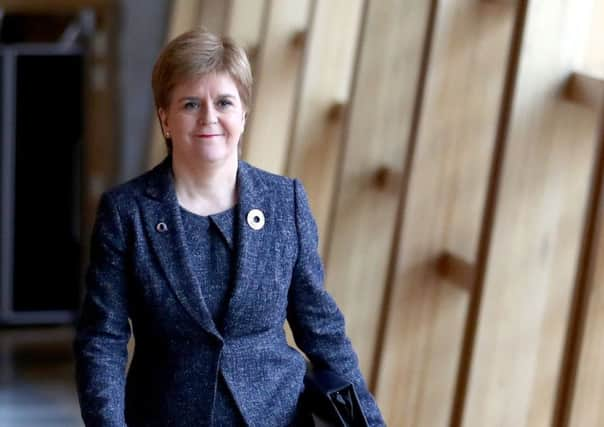Euan McColm: Nicola Sturgeon’s way most likely to fulfil Nationalist ambitions


When Alex Salmond returned as leader for a second stint, in 2004, that battle ended. The party united behind his preferred steady-as-she-goes journey towards a referendum. And – up until the point that the Nationalists lost the 2014 referendum – that strategy worked perfectly.
Today, as the SNP gathers for its annual conference in Aberdeen, that old battle between gradualists and fundamentalists – or fundies as they’re known in Nat circles – has recommenced. Party leader, Nicola Sturgeon, remains adamant that there is no shortcut to independence, no way of achieving her ambition of breaking up the United Kingdom other than through a referendum.
Advertisement
Hide AdAdvertisement
Hide AdOthers – including MP Angus MacNeil and senior councillor Chris McEleny – see things differently. If the UK government continues – as is its right – to deny the Scottish Government the power to call a second referendum, then they want to see a plan B. Possible plans B include declaring a general election win in Scotland to be sufficient for the Nationalists to begin divorce negotiations with Westminster.
Discussing this tension in her party, during an interview with BBC Scotland’s Brian Taylor, Sturgeon seemed rather exasperated.
Having reiterated her affection for MacNeil, she rubbished his suggestion.
There wasn’t, she said, a shortcut to a separate Scottish state; if there was, she’d have taken it.
Sturgeon’s explanation sounded compelling to me. If the SNP wished to demonstrate that there was majority support for independence then it had to do so through a process that was legal and legitimate. The route to independence had to be accepted in the UK, and internationally, particularly in Europe.
Given the SNP’s current position is that the result of the 2016 EU referendum – when a majority of Scots voted remain – makes the case for independence stronger, it is surely crucial that our European neighbours consider the achievement of independence to be on the level. Would the bloc really admit into membership a Scottish state that its members considered to have been illegally established? No, it would not.
Sturgeon, I think, bears some responsibility for the impatience of a section of the SNP membership. After defeat for the Yes campaign five years ago, the SNP attracted a wave of new recruits. Around 100,000 joined up in the days following defeat and these people, energised by the referendum campaign and bitterly disappointed by the result, were in no mood to slow things down.
Sturgeon decided to manage the expectations of these members by promising them that victory was just a step away. In speech after speech, she led them up to the top of the hill, promising another referendum was imminent, assuring them that the case for separation had grown stronger.
Advertisement
Hide AdAdvertisement
Hide AdHaving whipped up her crowd, Sturgeon failed to deliver. She looked at the polls – which continue to show that independence is the preference of the minority – and reflected that not only was a second referendum currently unwinnable but that defeat for a second time would devastate the SNP.
The belief of some fundamentalists that a general election – or indeed Scottish Parliamentary – win for the SNP would be enough for the First Minister to begin independence negotiations is utterly misguided.
The Nationalists swept the board in Scotland in the 2015 general election, winning 53 of the country’s 56 seats. But, even then, a majority of Scots cast their votes for unionist parties.
What’s more, so infuriated were voters by the SNP’s independence obsession that they punished the party two years later, removing 22 of those MPs – including former first minister Alex Salmond – from the House of Commons.
The idea that the SNP could declare a mandate for independence without the explicit support of the majority of Scots is the stuff of fantasy.
There are now some in the SNP who question whether Sturgeon is the right person to be leading. The MP Joanna Cherry – her reputation enhanced by her role in legal action over Prime Minister Boris Johnson’s decision to prorogue parliament – is seen by some of the more gung-ho among the party’s Westminster group as a leader-in-waiting. And, being impatient sorts, they don’t want her to be waiting for long.
And in the wider Yes movement, there is disquiet too, with some of the SNP’s fellow travellers beginning to question Sturgeon’s strategy.
In a lengthy analysis of the SNP’s record, published on the eve of conference, the director of the think tank Common Weal, Robin McAlpine, is deeply critical of the SNP’s record in office.
Advertisement
Hide AdAdvertisement
Hide AdThe SNP should, he writes, inspire support for independence by being bold in its use of power, by demonstrating what might be different in a standalone Scotland. Under Sturgeon, he says, the party is failing to do this.
Sturgeon’s SNP, it must be said, faces no serious challenge to its electoral dominance in Scotland. The Scottish Conservatives, back from the dead under the leadership of Ruth Davidson, are now dealing with her resignation over Boris Johnson’s reckless approach to Brexit. Sturgeon is entitled to expect that Davidson’s departure as leader of the opposition will hurt the Tory vote at the next election.
Meanwhile, Scottish Labour continues to atrophy. Last week it emerged that not only had former leader, Kezia Dugdale, allowed her membership of the party to lapse but that she had not felt able to vote Labour in May’s European Elections.
But electoral victories are not enough to take the SNP over the line in the independence race. If Nicola Sturgeon wishes to be the leader who breaks up the Union, she must do so by winning a referendum.
The First Minister is right to insist upon this. Those colleagues now urging her to take a different route risk creating the sort of division that might derail the independence juggernaut.